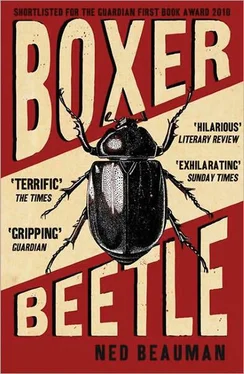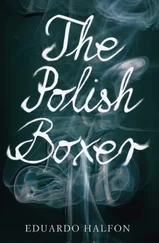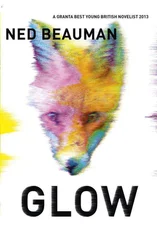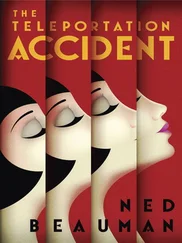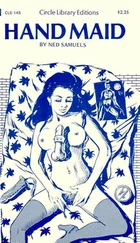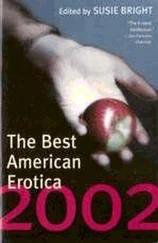‘Who or what is the “angel child”?’ The phrase made him shiver for some reason.
‘He says we shouldn’t concern ourselves with that.’
The inn was not quite as bad as Erskine had feared. A smudged woman in a red skirt was pouring tea from a samovar as they entered. At her feet lay a grey one-eyed mongrel, scratching at fleas and suckling a litter of tiny pups. The woman spoke a few sincere-sounding words of welcome and the driver helped them carry their baggage upstairs.
Their room contained only a double bed, a table and a chair. They didn’t unpack because there was nowhere to put anything. On the wall opposite the bed was an odd hand-drawn poster.
‘What’s that?’ Erskine said.
‘I think that’s supposed to be a louse, and it says, “This may you kill.” And I think the other thing is supposed to be a bath, and it says, “This may you save.” Meaning the bathwater? I may have misunderstood.’ It was nearly five o’clock. Gittins went to the window. ‘Dark soon. No point going out today.’ He took a volume of Finnish grammar from his pretentious red leather book-satchel and sat down at the table.
‘Don’t you want to see the rest of the village?’ said Erskine.
‘Not much to see.’
Erskine, determined to prove Gittins wrong, went out for a walk. But, in fact, apart from some hens, he couldn’t find anything to look at. Everyone seemed to be indoors. And the rain stung the back of his neck. So he went back to the room, sat on the bed, and read some of Sloane’s commentaries on Darwin. At seven o’clock the proprietress came upstairs with two bowls of tolerable stew. At eight o’clock Gittins took off his trousers and, humming happily under his breath, fed his cimicids, a ritual that even Erskine could recognise as weirdly erotic in nature. He was almost sure, at one point, that he heard Gittins murmur something to the insects about Francis Hemming. At nine o’clock they got into bed together and Gittins blew out the candle.
‘Goodnight,’ he said.
‘Goodnight,’ said Erskine. Gittins smelt even worse than the horses, but Erskine still fell asleep immediately.
The next day they got up before dawn and went out to a stream near the village. They both wore oil-silk capes. Erskine kicked up some rocks at a bend in the stream and Gittins held a very fine net in the water a few feet further down. Every few hours they would leave the net on a tree stump to dry and then pick through its contents for specimens. Whenever Gittins tried to talk about Hemming, Erskine pretended not to hear. So in the afternoon Gittins began to initiate conversations which were not at first about Hemming but which were designed to be steered casually towards the subject of Hemming within ten or fifteen minutes. And by the evening Gittins, like a master chess player, was diligently engineering conversational junctures at which, although he had not yet himself mentioned Hemming, it would have been perverse for Erskine to respond with anything other than the allusion to Hemming that was so logically invited — leaving Erskine no choice but to go back to ignoring Gittins as he had in the morning. What seemed to captivate Gittins was Erskine’s deliberate refusal to make clear whether he approved or disapproved of Hemming’s regime. Meanwhile, Gittins didn’t seem to want to discuss his cimicids too much with Erskine, much as a man will only talk about his mistress with his closest friends.
When, with night falling, they returned to the inn, there was a small crowd of boys waiting outside. Gittins greeted them in Polish. None replied, but the oldest, a crooked-toothed but handsome lad of about sixteen, held out a dented tobacco tin. Erskine smiled and shook his head.
‘Come on,’ said Gittins.
‘I don’t smoke a pipe.’
‘I don’t expect it’s tobacco.’
So Erskine took it and opened it. It was empty but for five or six crawling black specks. Gittins got out his magnifying glass and bent over the tin. ‘ Anoplura .’
‘Lice? Is this a joke?’
‘They must have heard from someone that we’ve come here to look for insects.’
Erskine shut the tin and held it out to the boy, but he wouldn’t take it back.
‘He probably wants money,’ said Gittins.
‘If we give him any now we’ll have to fork out to all of them, every day, for as long as we’re here,’ said Erskine. But then he caught the oldest boy’s eye again. There was something about his expression, cocky and nervous at the same time, and about the coal-dust stubble on his upper lip, which made Erskine reconsider. The boy reminded him of someone, someone for whom he felt a certain ardour, someone whose face he’d last seen when he was back in London, but he couldn’t think who. ‘Ask him how much he wants,’ he said.
Gittins spoke to the boy. ‘He wants ten groszy.’
‘How much is that?’
‘About tuppence, I think.’
‘Oh. Well, let’s give them all ten groszy.’
‘I don’t have any change that small.’
‘What do they need it for? There are no shops here.’
‘I think pedlars come through sometimes.’
Erskine gave all the boys a zloty note from his wallet. None of them moved.
‘What more do they want?’
Gittins enquired. ‘They want to give us the specimens, but they want their tins back afterwards.’
‘Bloody hell. Ask the oldest if he will sell us his tin for ten zloty.’
Gittins translated, but then all the boys started to babble at once. ‘Now they all want to sell their tins. This one’ — a grimy child of about six years old with a strangely adult face, like a homunculus — ‘is insisting very vehemently that he has the best tin.’
‘If we give the money to anyone but the biggest, it will get stolen.’
So Erskine pressed a ten zloty note into the warm hand of the oldest boy. With a little bit of what sounded like swearing the argument ended, and one by one the smaller boys emptied the contents of their own tins into the tin that was now Erskine’s. Then they dispersed. The oldest boy did not even look back at Erskine as he hurried off. When they were all out of sight, Erskine shook all the lice on to the ground and stamped on them.
‘“These may you kill”,’ he recalled.
‘You know, Erskine, I rather think we may have been swindled,’ replied Gittins. For the first and last time on that trip they laughed together. Erskine wondered if any of those boys might be the ‘angel child’. Perhaps the handsome one. But then what could he have to do with bad luck?
They’d been up in the room for about an hour when Erskine, hoping to start a friendly, non-Hemming-related conversation, made the error of saying, ‘Did you know that Captain Robert Fitzroy nearly rejected Charles Darwin as a naturalist for the HMS Beagle in 1831 because he didn’t trust the shape of Darwin’s nose?’
‘Really?’
‘Says so here. What a turning point in scientific history.’
‘What are you reading?’
‘Sansom’s The Candle Flame .’
‘What’s it about?’
‘Oh, the theory and practice of eugenics. It’s excellent.’
‘You don’t believe in any of that rot, do you?’
Erskine was speechless for a moment. ‘I intend to devote my life to “that rot”, actually.’
‘The betterment of the Anglo-Saxon race. The triumph of the germ-plasm.’
‘Yes.’
‘Come on. There are forty-five million people in Britain, Erskine. And you plan to start breeding for pedigree. How do you suppose that will happen?’
‘It’s simply a matter of systematic encouragement and discouragement.’
‘And by discouragement you mean the lethal chamber?’
Erskine hated that phrase. It stood for every irrational, feminine objection that the average imbecile had to the project of eugenics, saving him from having to think for even a moment about the substance of his prejudice.
Читать дальше
